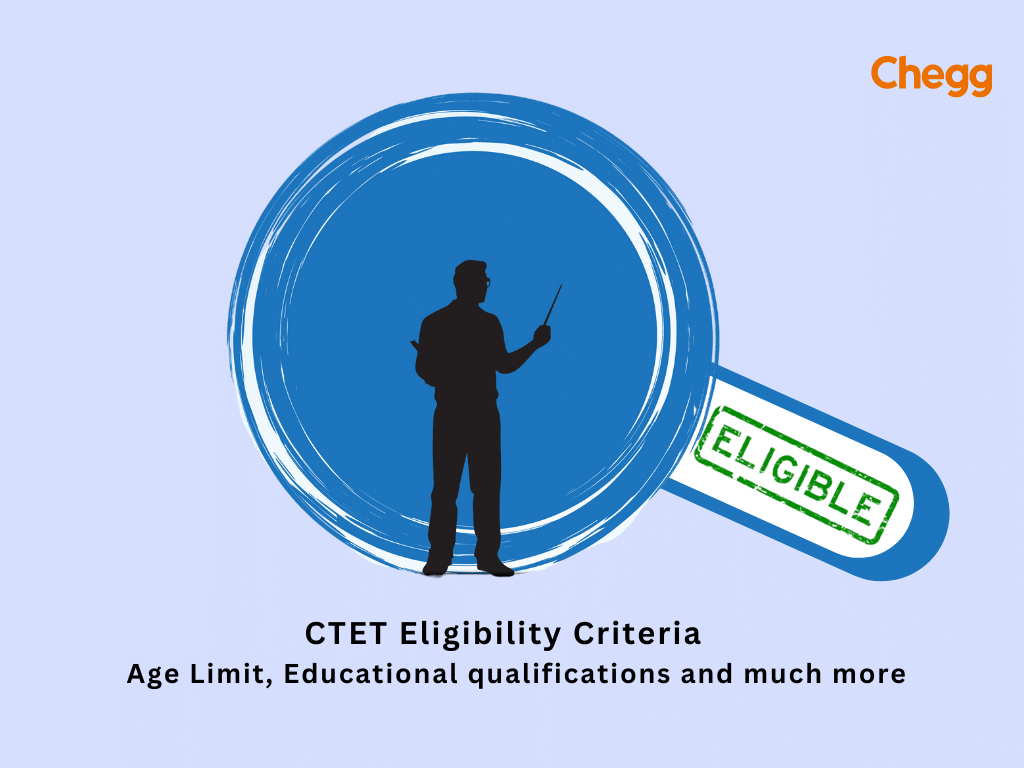
The Central Board of Secondary Education (CBSE) administers the CTET (Central Teacher Eligibility Test) twice annually. This exam screens candidates who want to apply for teaching positions in both government and private schools.
Before filling out the application form, aspirants must check the detailed CTET qualification criteria. Failing to meet these requirements will lead to the rejection of your application, regardless of your score.
The CTET exam consists of two papers:
Candidates aspiring to teach classes I to VIII must qualify for both Paper-I and Paper-II.

Before submitting your application for the CTET 2025 exam, it is essential to thoroughly review the entire set of eligibility conditions.
If you plan to appear for this test, you must satisfy all the requirements, which include:
The National Council for Teacher Education (NCTE) introduced a significant addition to the existing CTET educational qualifications through a notice on October 13, 2021.
Under this revised CBSE CTET eligibility criteria, candidates who possess a Post-Graduation degree in any discipline with a minimum of 55% marks (or an equivalent grade), coupled with a three-year integrated B.Ed-M.Ed course, you are now qualified to appear for both Paper 1 and Paper 2 of the CTET exam.
The primary nationality requirement for CTET eligibility is Indian Citizenship. However, applicants who are subjects of Nepal or Bhutan, or a Tibetan refugee who arrived before January 1, 1962, with the intention of permanent settlement in India, are also eligible. This criterion also extends to individuals of Indian origin who have permanently migrated from countries such as Pakistan, Sri Lanka, Kenya, Uganda, Tanzania, Zambia, Ethiopia, Vietnam, and Burma.
Applicants must be at least 17 years old to be eligible for the CTET exam. There is no upper age limit specified, as the official CTET notification does not impose any maximum age restriction. However, candidates must meet the necessary educational qualifications outlined for CTET. Additionally, currently employed teachers are also allowed to take the exam to assess and enhance their professional knowledge and competencies.
As per the CTET Eligibility requirements, the educational qualifications required for CTET Paper 1 and CTET Paper 2 are different. Candidates can check the details of the same below.
To be eligible for CTET Paper 1, candidates must meet one of the following educational qualifications:
To apply for CTET Paper 2, candidates should have completed their graduation with at least 50% marks and either passed or be currently enrolled in the first year of a Bachelor of Education (B.Ed) program from a recognized university or institution.
In addition, candidates with any of the following qualifications are also eligible:
No, having a Bachelor of Education (B.Ed) degree is not a compulsory requirement to appear for the CTET exam. However, candidates must meet the minimum educational qualifications, such as completing Senior Secondary (or its equivalent) with at least 50% marks and either having passed or currently pursuing the final year of a 2-year Diploma in Elementary Education, a 4-year Bachelor of Elementary Education (B.El.Ed), or a 2-year Diploma in Special Education. So, while B.Ed is one of the accepted qualifications; it’s not the only pathway to eligibility.
Yes, B.Tech graduates can apply for CTET, provided they fulfill the required teacher training qualifications recognized by the National Council for Teacher Education (NCTE) or the Rehabilitation Council of India (RCI). Here’s how eligibility breaks down:
Note: Candidates currently enrolled in any of the above teacher education programs (recognized by NCTE or RCI) are also eligible to appear for CTET.
✅ Bonus: There is no negative marking for incorrect answers in the CTET exam.
There is no limit on how many times a candidate can take the CTET exam. Even those who have already qualified can reappear to improve their score.
No prior teaching experience is needed. Both fresh graduates and experienced educators who meet the educational criteria are welcome to apply.
Candidates who meet the minimum score requirement as per the CTET (Central Teacher Eligibility Test) eligibility are considered qualified. General category candidates must score at least 60% of the total marks to qualify. For reserved categories, including Scheduled Tribe (ST), Scheduled Caste (SC), Other Backward Class (OBC), and Differently Abled, there is a 5% relaxation, meaning these candidates need to score at least 55%.
General category candidates scoring 60% or more will be deemed qualified. Additionally, there is no negative marking for incorrect answers, which benefits all candidates.
| Category | Cut-Off score |
| For General | 90 marks |
| Other Reserved Category | 82 marks |
The CTET (Central Teacher Eligibility Test) eligibility is relatively flexible compared to other exams, with the key advantage being the lack of restrictions on the number of attempts. Candidates can take the CTET (Central Teacher Eligibility Test) as many times as needed, which allows them to retake the exam to improve their scores if desired. This flexibility is beneficial, especially for candidates aiming to enhance their performance and secure a higher score.
Students should thoroughly review the Central Teacher Eligibility Test eligibility criteria, including age limits and category requirements, before applying. It is the responsibility of the recruiting authority to verify the applicant’s eligibility. Candidates must ensure they meet all eligibility requirements to avoid personal liability. This article has addressed the key points of the Central Teacher Eligibility Test exam eligibility comprehensively.
When preparing for the CTET(Central Teacher Eligibility Test) exam, there is a wide array of books available in the market. It’s essential to choose the most effective and highly recommended resources for your study. Additionally, reviewing NCERT textbooks from Classes 6 to 12 is crucial for solidifying your understanding of the concepts. Below is a table listing the recommended section-wise books for the Central Teacher Eligibility Test exam.
| CTET Exam Preparation Book Name | Publisher/Author Name |
|---|---|
| Child Development and Pedagogy for CTET & TETs (Paper I & II) | Arihant Publication |
| CTET & TETs Bhasha Hindi Paper I & II | Arihant Publication |
| CTET and TETs English Language and Pedagogy (Paper I & II) | Arihant Publication |
| A Complete Resource for CTET (Language I): English and Pedagogy | Geeta Sahni (Author), Pearson Publication |
| Environmental Studies (EVS) Exam Goalpost for CTET & TETs, Class I-V | Wiley Publication |
| Success Master CTET (Social Science/Studies) Paper 2 for Class VI-VIII | Arihant Publication |
Every year, over 2.5 million candidates take the CTET exam, according to last year’s statistics. To successfully pass this exam, a well-structured and dedicated study plan is essential. Here are some valuable tips to help you ace the CTET exam on your first try:
Absolutely! Here’s a comprehensive overview of the salary structure for various teaching roles under CTET:
Teachers who qualify for CTET also enjoy a variety of allowances, such as:
These elements collectively contribute to a highly appealing compensation package for CTET-qualified educators.
Preparing for the Central Teacher Eligibility Test exam demands a well-thought-out strategy and dedicated effort. Here are some effective tips to help you gear up:
Child Development and Pedagogy
Language I and II
Mathematics
Environmental Studies
Additional Tips
To qualify for the Central Teacher Eligibility Test (CTET), candidates must fulfill certain educational and age requirements. For those aiming for the Primary Stage (Classes 1 to 5), they should have completed their Senior Secondary education with a minimum of 50% marks and either have finished or be in the final year of a 2-year Diploma in Elementary Education (D.El.Ed) or a 4-year Bachelor of Elementary Education (B.El.Ed). For the Upper Primary Stage (Classes 6 to 8), candidates are required to hold a Bachelor’s degree and have either completed or be in the final year of a 2-year Diploma in Elementary Education or a 1-year Bachelor in Education (B.Ed).
RECOMMENDED READS:

Yes, you can apply for CTET after completing the 12th grade, but only for Paper 1 (Primary Stage: Classes I to V). Candidates who have completed their 10+2 with at least 50% marks and have or are pursuing a Diploma in Elementary Education (D.El.Ed) are eligible.
There is no upper age limit. However, candidates must be at least 18 years of age to appear for the exam.
To be eligible for the CTET exam, candidates must meet different criteria for Paper 1 and Paper 2. For Paper 1 (Primary Stage: Classes I to V), candidates need to have passed the 12th grade with at least 50% marks and hold a Diploma in Elementary Education (D.El.Ed) or an equivalent qualification. For Paper 2 (Elementary Stage: Classes VI to VIII), candidates should be graduates with at least 50% marks and have a B.Ed degree or an equivalent qualification.
No, a Bachelor of Education (B.Ed) degree is not compulsory to sit for the Central Teacher Eligibility Test (CTET).
Candidates who meet the eligibility criteria may retake the exam as many times as they would like to. They can re-attempt the exam to increase their scores.
B.Ed is a teaching degree, while CTET is a qualifying exam for government school jobs. Both are important—B.Ed builds your teaching skills, and CTET makes you eligible to teach in central schools.

Authored by, Nidhi Kukreja
Exam Prep Advisor
Nidhi is a passionate writer who specializes in long-form, research-backed content that delivers real value. Whether she’s writing blog articles or creating educational modules, she focuses on making complex topics clear, detailed, and easy to understand. Her content is designed to build knowledge and credibility, helping readers gain deeper insights with every piece.
Editor's Recommendations
Chegg India does not ask for money to offer any opportunity with the company. We request you to be vigilant before sharing your personal and financial information with any third party. Beware of fraudulent activities claiming affiliation with our company and promising monetary rewards or benefits. Chegg India shall not be responsible for any losses resulting from such activities.
Chegg India does not ask for money to offer any opportunity with the company. We request you to be vigilant before sharing your personal and financial information with any third party. Beware of fraudulent activities claiming affiliation with our company and promising monetary rewards or benefits. Chegg India shall not be responsible for any losses resulting from such activities.